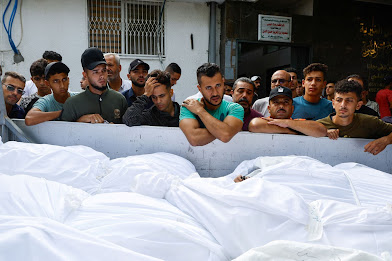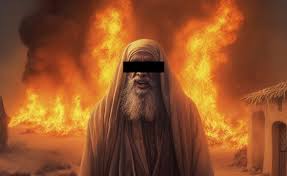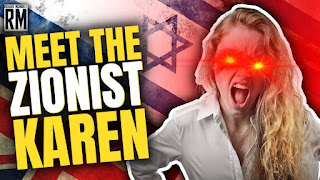Dear Zionist commentator, who repeats something he or she copied from someone else.
1. Yes, if it means so much to you, I can share with you how saddened I was that Israelis were killed on October 7th, by Hamas and by the IDF itself. Very sad. I mean every word. I regret every loss of life. I have asked an Israeli Rabbi on camera to tell me about those events and I honestly do feel sorry for the all the people who suffered that day, though, admittedly, less so for the ones serving in the IDF since I do think IDF soldiers are a perfectly legitimate target for the Palestinian resistance. You're already itching to write another thing you have copied from someone else, but wait, there is more.
2. No, I don't condemn Israeli crimes because I hate jews, I am in fact heavily influenced by jewish culture, my work (psychotherapy) is practically the jewish talking cure and am literally surrounded by books written by jewish authors, mostly on psychology, also lots of books on the Holocaust. Culturally I am also very influenced by jews. I have never in any way discriminated against any jew. It wouldn't even occur to me. I have shared dinners with jews, I have joked with jews, I have helped jews find a job... You can call me a jew hater all you want, but the punch doesn't land.
3. I did visit Nazi concentration camps and yes, I was horrified. I've also watched just about every Holocaust movie there is and it breaks my heart every time, yes, really. Some parts of Edith Eger's books haunt me to this day. Unfortunately I have most likely read more books on the Holocaust than you did and from an earlier age without anyone pushing me to do so.
4. I sadly have only 24 hours in a day and I do not get paid to write about every single crime happening in this world. I have never been to Sudan. Maybe I should. I have been to Israel, I have met Israelis and I have met Palestinians, I have not met any Sudanese. If any Sudanese are reading this, please come on my podcast and we can talk about the challenges of your country too. I did write about Syria, but you likely do not speak Dutch, so there is no way for you to really check, even though you are quick to claim I have never written about it. Oh, and my X account is not the alpha and omega of what I stand for. Some of you seem to think X is a full record of everything I have done in my life. Generally I prefer to not write about things I didn't study, I am a very modest, humble person who is often very criticial of his own opinions and thought processes, but on some things I consider myself an expert and that happens to inculude Palestine and Israel. I understand why you'd wish I had studied a different genocide. I know a lot about the holocaust and things like Srebrenica as well if that makes it any better.
5. Nothing I say or do will ever make it any better of course, because the truth of the matter is that you don't want anyone criticizing Israel and will find any reason at all to try and deny people the right to criticize Israel. I wish you could understand how your manipulative tactics only make me see Israel in an even worse light.
6. Your mentioning of the Hamas charter means extremely little to me. There are some very fishy passages in the Bible and I don't hold those against all Christians either. Hamas has stated that they are not out to kill all Jews. I agree you can call me naive, really, please do, am a good person and a good person is often a bit naive, but I believe them. I don't think Hamas wants to kill all Jews. Maybe some few do. Just like am sure we can easily find some Israelis who want to kill all Palestinians. Those are not very shy on social media channels.
7. I frankly don't care how many people voted for Hamas, even if they all voted for Hamas ten times in the same election it would still be wrong for you to bomb women and kids. Am sure the kids you're killing didn't vote for Hamas. Also, if you make circumstances bad enough people will vote for any party who at least makes those circumstances a little bit better in the short term
8. Hamas does not pose an existential risk to Israel. Israel did not have to react. Even on the purely strategic level it was a dumb thing for Israel to do. Look how much it's already damaging Israel. I know it's hard to accept that slaughtering thousands is not the right strategy, since you're enjoying it so much, but it's not working.
9. Comparisions between bombing Gaza and the Second world war are ridiculous. Hamas doesn't come close to being the threat Nazi-Germany was. I would also argue that the average German citizen still had a better chance to escape allied bombardments than the average city in Gaza. If I have to bombed in Germany anno 1945 or bombed in Gaza anno 2024 I will take my chances in Germany. Yes, America dropped nuclear bombs, I personally think those were overkill and a war crime, but even if am wrong on that, what you've done to Gaza is far worse. Again, because Hamas does not pose the threat imperial Japan did.
10. The Palestinians rejected every peace deal ever made to them... Am not Palestinian so I can't say what is an acceptable deal and what isn't. As someone who is not Palestinian there is MAYBE a deal I would have accepted, but again, my family wasn't terrorized by Israel (at least not so far). Them rejecting peace deals still doesn't make it morally right to do things that could indeed annihilate them as a people. Plus, if Israel was ever serious about peace there should not be a single Israeli settler in all of the West Bank.
11. No, you don't have to kill everyone for it to be genocide. This is genocide: 'New conceptions require new terms. By "genocide" we mean the destruction of a nation or of an ethnic group. This new word, coined by the author to denote an old practice in its modern development, is made from the ancient Greek word genos (race, tribe) and the Latin cide (killing), thus corresponding in its formation to such words as tyrannicide, homicide, infanticide, etc. Generally speaking, genocide does not necessarily mean the immediate destruction of a nation, except when accomplished by mass killings of all members of a nation. It is intended rather to signify a coordinated plan of different actions aiming at the destruction of essential foundations of the life of national groups, with the aim of annihilating the groups themselves. The objectives of such a plan would be the disintegration of the political and social institutions, of culture, language, national feelings, religion, and the economic existence of national groups, and the destruction of the personal security, liberty, health, dignity, and even the lives of the individuals belonging to such groups. Genocide is directed against the national group as an entity, and the actions involved are directed against individuals, not in their individual capacity, but as members of the national group.' Raphael Lemkin, a jewish lawyer. His definition fits perfectly and what Israel has done counts as genocide. Full stop.
12. Control over Gaza was never given back to the Palestinians. Yes, a small number of Israeli settlers had to leave and were forcibly evicted by the IDF, but at the same time Israel injected more settlers into the West Bank. The Gazans didn't have full control of their sea coast nor of their air space. Gaza was only given back because it was too difficult to control it from the inside, so instead Israel opted to wall it in as much as possible. With the excuse always been every restriction was an anti-terrorist precaution. Then it monitored Palestinians, killed them when they protested peacefully and from time to time the IDF waltzed in and 'mowed the lawn'. At the same time Palestinian communities in the West Bank were more and more cut off from each other and Palestinian territory was fragmentized. If you treat people like shit some will fight back.
13. Yes, Israel was founded thanks to the use of terrorism. Strange that terrorism was ok then, but is never ok now
14. I don't care if you slit someone's throat or drop a bomb on then from a multi million dollar aircraft, both can be terrorism.
15. Yes, I really do think you don't want to admit you like it when a lot of Palestinians die. Am very open to you showing how much you care about Palestinian lives.
16. Since you keep asking me to show outrage over Armenia, Darfur and a whole list of other horrible man-made catastrophes please link to your amazing articles and videos you have made over the years explaining and condemning all those crimes. It would be very helpful. Thank you.
17. I haven't reread what I have written (yet), since I now have to go be of service to others in order to put food on the table for my family, but if you find a typo and you call me a moron, because I mispelled something, then it still doesn't mean your murdering of kids is ok. But to give you some ammo in your fight to not care about dead kids, here is already one typo: Israel murderererererers kids on purpose to plunge the Palestinians into despair. It's a deliberate strategy.
from X






.jpg)
.jpg)








.jpg)
















.jpg)


.jpg)
.jpg)




